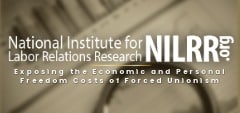Missouri UFCW Boss’s Apologia For Forced Unionism Misrepresents the Facts
A long article appearing in the Columbia Missourian yesterday (see the link below) about grass-roots efforts to make Missouri America’s 25th Right to Work state is a mixed bag. Reporter Casey Bischel uncritically repeats several standard Big Labor canards regarding government-promoted union monopoly bargaining in the workplace and the compulsory union dues and fees for which it furnishes a convenient rationalization. However, Bischel also allows a couple of the Show Me State’s seasoned Right to Work activists, Greg Johns and Ron Staggs, to have their say and respond to some of Big Labor’s principal anti-Right to Work clichés.
This post will focus on one of Staggs’ points, confirmed by his own personal experience, and on United Food and Commercial Workers (UFCW) local union official Dave Anderson’s factually and logically deficient attempt to rebut Staggs.
Staggs, who is now retired, worked in the communications industry for several decades. From 1970 until 1985, while working as customer service representative, an installer, and a cable splicer, he was a dues-paying member of the Communications Workers of America (CWA) union. He ultimately left the union to accept a management job as a construction foreman with Southwestern Bell because, under the CWA contract, his employer was not allowed to raise his pay, since by 1985 he was “at the top of the union pay scale.”
Bischel offered this summary of Staggs’s view of the typical impact union monopoly bargaining has on employee pay:
Companies have a set budget to spend on labor costs, he figured, so contract negotiations are about slicing the dollar. If some people make more than they deserve for the job, that means others can’t make as much.
Since Right to Work laws’only immediate purpose is toprohibit the termination of employees for refusal to pay dues or fees to an unwanted union, they do not necessarily deter union officials from making and obtaining compensation demands that benefit some employees at the expense of others. But at least under Right to Work laws the employees who get harmed by a union contract can refuse to bankroll the union officials who are responsible. That’s a major step in the right direction, although, as Staggs suggests, the ideal solution is also to allow employees who don’t think the union in their workplace is helping them to bargain for themselves or perhaps even through another union.
In response, Anderson, a UFCW shop steward in Columbia, first insinuates that Staggs has got his facts wrong. There is “nothing in a union contract that states an employer can’t pay someone more than the union amount,” he told Bischel.
But this is misleading, if not deliberately deceptive. To prevent employers from paying employees with above-average skills and/or work ethics wages that are above union scale, Big Labor bosses need not get inserted into the contract language explicitly prohibiting employers from paying “more than the union amount.” Under current federal law, all union officials need to do to block merit pay at a unionized firm is refuse to give their permission for it.
Moreover, in 2012, when the U.S. Senate considered legislation, known as the Rewarding Achievement and Incentivizing Successful Employees (RAISE) Act, that would have allowed unionized employers to reward their best workers with pay increasesbased solely on merit, without first receiving union officials’ permission, Big Labor lobbied intenselyagainst it and thus ensured its defeat.
William Samuel, a top official of the AFL-CIO union conglomerate (with which the UFCW union is affiliated), explained that his organization does not believe any unionized employer should have the right, without a by-your-leave from union chiefs, to “grant pay increases to selected employees in a bargaining unit.”
Perhaps because he knew his claim about union contracts was misleading at best, Anderson went on to suggest that employees who reasonably believe they get paid less as a consequence of being unionized should “find a new [presumably union-free] job.” This may indeed be the best way for many union-impaired workers to advance economically, but it does not explain why such workers who choose, whatever reason, to stay in their current positions should be forced to pay dues to the union that is harming them.
In response to a question from Justice Sam Alito at the U.S. Supreme Court hearing regarding the case Harris v. Quinn early this year, union lawyer Paul Smith basically admitted that Big Labor claims the legal power to force employees to pay for union “representation” that is detrimental to their interests. Since Smith has already let the cat out of the bag, Anderson and other proponents of the forced-unionism status quo in Missouri might as well explicitly admit that they agree with him.
The AFL-CIO hierarchy is determined to prevent unionized employers from granting “pay increases to selected employees in a bargaining unit” without union officials’ permission. Yet Missouri union operative Dave Anderson gives the impression union bosses have no problem with unionized employers who “pay someone more than the union amount”! Image: Rob Green/Bergman Group

